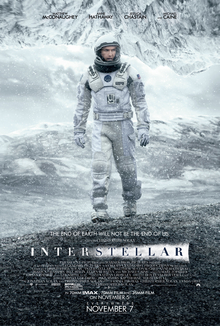 Christopher Nolan makes complicated movies. Movies about space tend to be complicated. So when Christopher Nolan makes a movie about space, you get Interstellar, a trippy glimpse into the future that features some intriguing pseudoscience, a superb cast, gorgeous visuals, and laughable dialogue. It's a movie I liked, but did not love, one that has promising ideas, but falls a bit flat on execution.
Christopher Nolan makes complicated movies. Movies about space tend to be complicated. So when Christopher Nolan makes a movie about space, you get Interstellar, a trippy glimpse into the future that features some intriguing pseudoscience, a superb cast, gorgeous visuals, and laughable dialogue. It's a movie I liked, but did not love, one that has promising ideas, but falls a bit flat on execution.
Interstellar begins a few generations into the future, when the people of Earth have completely outstripped their resources through war, pollution, and greed. Matthew McConaughey plays Cooper, a widowed former NASA test pilot who was forced to become a farmer because the world needed more food instead of astronauts. He lives on a farm with his two young children and father-in-law, where apart from the fancy technology, their living conditions resemble scenes from Ken Burns' The Dust Bowl. His ten-year old daughter, Murphy (a precocious and delightful actress by the name of Mackenzie Foy), is extremely bright but keeps talking about a ghost in her room that is trying to send her messages. Disbelieving at first, Cooper eventually realizes there are in fact hidden messages contained in the poltergeisty happenings in his daughter's room. He deciphers them and stumbles upon a secret NASA program whose mission is to travel into other solar systems, by means of a mysterious wormhole that has appeared near Saturn. They are trying to find Earth-like planets that can sustain human life before the human race is driven to extinction: quite an ambitious goal. The program is headed by Cooper's former mentor, Professor Brand (the reliable Michael Caine), and Cooper is convinced to set off into space with three other astronauts, including Brand's daughter, Amelia (Anne Hathaway). Space adventures ensue.
Interstellar is visually stunning but not revolutionary. Apart from a breathtaking sequence through the wormhole and an (apparently) scientifically accurate depiction of a spinning black hole, space looks pretty much the same as it always has in the movies. The robots depicted in the movie are wonderful, initially seeming rather unexciting and then slowly revealing just how much they are capable of. The alien planets that the astronauts land on are not exceptionally mesmerizing and look like they've just stepped into a remote corner of Iceland. The plot is really what needs to keeps the movie moving, and by and large it does. Interstellar is almost three hours long, and I was never bored. There's a lot of head-scratching discussion about relativity, which I'm sure would either delight or infuriate physicists, and much debate about gravity, quantum mechanics, and other high-level topics that I never understood in college and don't comprehend now. While that talk is dumbed down to make some semblance of sense to the audience, the more annoying aspect of the dialogue is the hazy philosophic rambling courtesy of McConaughey and Hathaway that resembles an episode of True Detective. It's unfortunate that McConaughey has become synonymous with that kind of nonsensical speechifying, and while Interstellar is not chock-full of such moments, there are enough to get a trifle wearisome.
The movie does pack some emotional punch, with a heartbreaking arc between Cooper and his children as he disappears into space and has to miss their entire childhood. There is also a fantastic cameo, which the marketing department has done a hell of job keeping secret, and which certainly piqued my interest right when my attention was flagging. There are plenty of twists, moments of exceptional courage and horrific betrayal, and most thankfully, a complete resolution. The one thing I appreciate in a Christopher Nolan film is that you do get a satisfying conclusion. There might be a sense that more is left to accomplish offscreen, but the characters have successfully followed a story arc and most loose ends have been tied up. Interstellar may have very weird and bizarre themes, but it resolves them with a neat ending that leaves you with only a few unanswered questions that you can then fiercely debate with your friends.
Interstellar is not Nolan's best movie, but it is still a decent film. Space is always a worthy subject for film, and Nolan's deft use of imagery and sound to alternately blast your eyes and ears with novelty and then abandon you in the dark vast quiet of space is an amazing cinematic experience. The all-star cast does what it can with a serviceable story but strained dialogue, and there's much to like and dislike. For me, the things I liked outweighed the annoyances, and ultimately I enjoyed Interstellar. Depending on your cinematic tastes and scientific background, you may or may not agree.
No comments:
Post a Comment